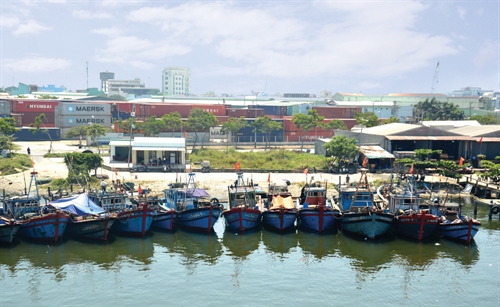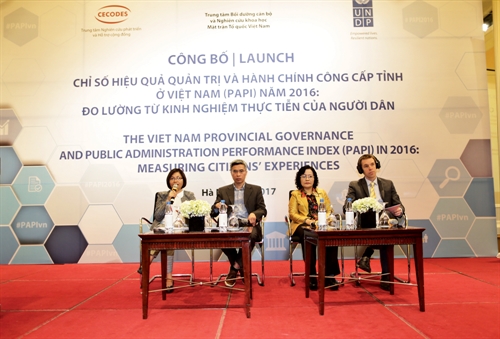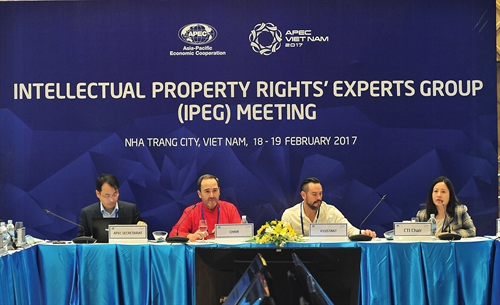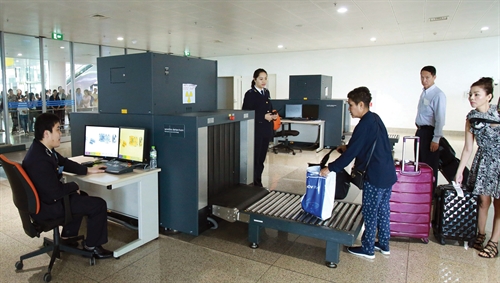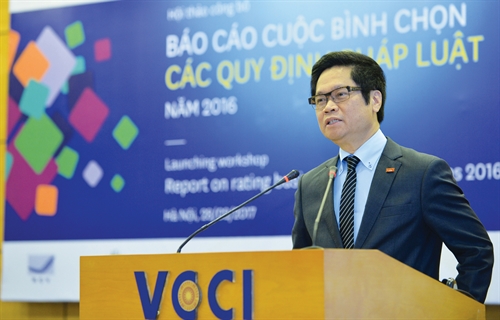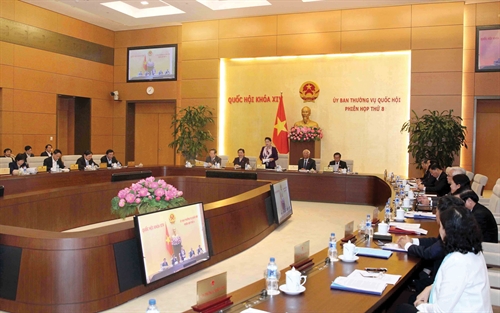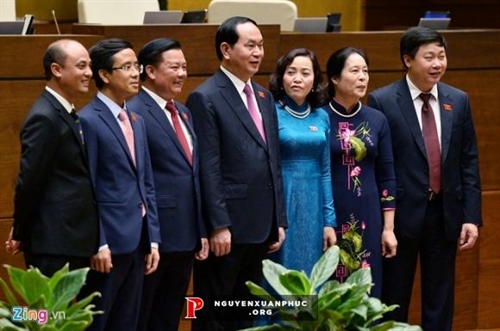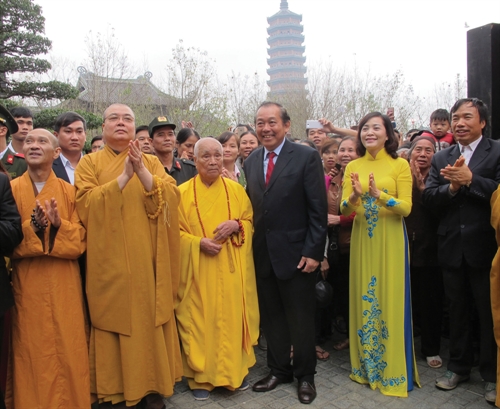Dr. Tran Anh Tuan
Deputy Minister of Home Affairs
World experiences show that the building of a contingent of leading and managerial officials always constitutes a primary priority in human resource development strategies. For Vietnam, to well develop human resources - one of three breakthroughs for socio-economic development and accelerated reform of the civil service and civil servant regime, heightening the quality of leading and managerial officials is always an urgent requirement and a practical demand at present. The contingent of leading and managerial officials is built through various solutions such as discovery, recommendation, nomination, attraction, fostering, planning, relief from duty, etc. of which selection of worthy persons for appointment is decisive to the quality of this contingent.
Existing problems
To raise the quality of the contingent of leading and managerial officials, it is necessary to solve problems and limitations which negatively affect the objectivity, fairness, transparency and quality of selection work. Studies reveal that the current process of selecting persons for appointment to be leading and managerial officials is hamstrung by the following problems:
The head’s responsibility
In reality, although many Party documents have laid stress on the responsibility of the heads[1] in appointment work, it has not been clarified yet. As a result, when something happens to appointed persons, the heads, who have signed appointment decisions on the basis of personal records, criteria, conditions, regulations on the appointment process as well as the resolution or opinion of the Party committee, have often denied their responsibility, claiming that the Party Committee is the decision maker while they themselves only abide by the Party Committee’s decision and their signing is just an administrative act. Therefore, the heads’ responsibility here should be further clarified in relation to their competence. This means that besides the leadership of the Party - Party Committees - over personnel work, the heads’ role (including their competence and responsibility) in their administrative agencies or non-business units must be clarified. Since the working regime in administrative agencies and non-business units is the single-boss regime, their heads must be accountable before law for all activities of their respective agencies or units, including personnel work.
Publicity, objectivity, fairness and source of personnel for selection
Despite these issues have been emphasized in various documents and instructed for implementation, limitations remain in the process of implementation. Criteria, conditions and number of persons to be selected for leading and managerial positions have been made public only at the time of commencement of the selection process, but not in the mass media as for the recruitment of civil servants. The source of personnel for recommendation and nomination or the scope of qualified registrants for selection is restricted mostly to cadres, civil servants and public employees in each unit or agency, but not opened to people in other agencies or units within the same ministry, sector or locality, not to mention people from the private sector. This has limited the source of personnel for selection and narrowed the scope of attracting talented persons.
Collection of votes of confidence
In the appointment process, confidence votes are collected for reference purpose, but in fact they are as decisive as election votes. Basically, those who get the highest number of confidence votes are all appointed. Persons with lower votes are rarely appointed. Moreover, confidence votes are designed like election votes, with two options “yea” and “nay”. This has led to the fact that some civil servants do not attach importance to tempering themselves morally and professionally for better accomplishment of their assigned tasks but only concentrate on winning others’ favor in order to get high votes when they are chosen for appointment. Consequently, those who establish good relations with everyone will get high votes of confidence, then be almost certainly appointed to be leading or managerial positions. Meanwhile, persons who are truly capable but outspoken often get low confidence votes and are surely not appointed.
Such way of collecting votes of confidence saw that a number of appointed heads and deputy heads prove to be unworthy, showing many limitations in managerial work and meeting with difficulties in leading or directing their agencies or organizations in the performance of assigned tasks. Besides, it fails to bring into full play the role and responsibility of the heads while making the Party Committees’ leadership passive and perplexed.
Way of thinking
Due to the slow renewal of thinking to meet the practical requirements, we still lack mechanisms to mobilize and encourage leading and managerial officials to resign when they fail to meet working requirements and strong measures to relieve from office those who are not fully qualified and capable to handle their daily work but not to the extent of being disciplined. That is why the quality of leading and managerial officials in many agencies and units remains far below the requirements of national industrialization and modernization. Many localities have been reluctant to promote and appoint young and capable persons while still attaching importance to senior officials according to the outmoded motto “song lau len lao lang” (those who live long will be promoted to be village patriarchs). Authorities at different levels and in different organizations, even Party Committees, remain irresolute in selecting and appointing virtuous and capable persons as well as young talents. This has paved the way for opportunists to be appointed to leading and managerial positions. Moreover, there still exists a thinking that when a person resigns or is relieved from a position or even dismissed, he will never be considered for re-appointment.
Leadership and management qualities
The application of regulations of the Party and the State to the practical conditions of each agency or unit has been somehow rigid and passive, attaching greater importance to academic diplomas and certificates than to work achievements and efficiency. Not a few Party Committee members do not fully know the capabilities and qualifications of candidates before casting their votes. Their decision relies largely on the proposal of the advisory body (namely the organization and personnel commission) of the Party Committee. This has failed to promote the wisdom and responsibility of every Party Committee in the selection and appointment process.
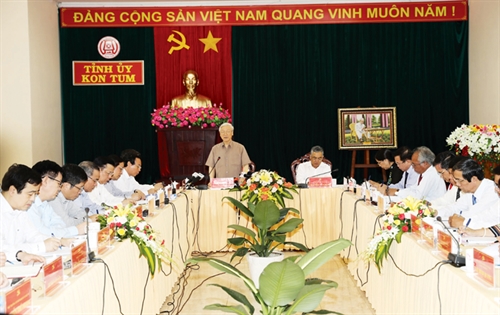 |
| Party General Secretary Nguyen Phu Trong addresses a working meeting with leading officials of Kon Tum province on April 14__Photo: Tri Dung/VNA |
Trial of examination-based recruitment
Viewpoint of the Party and the direction of the Government on renewal of the selection method
The conclusions of the 9th plenary of the Xth Party Central Committee on further stepping up the implementation of the personnel strategy towards 2020 point to the requirement: “To expand the pilot renewal of the method of selecting persons to section-leading positions in provinces and centrally run cities and department-leading positions in ministries and ministerial-level agencies, who will be considered for selection, training, fostering, appointment and employment under planning.”
The XIth National Party Congress’s documents further determine the following tasks: “To well implement the personnel strategy in the period of accelerated industrialization and modernization; to renew thinking and methods, addressing shortcomings at each stage of personnel work; to establish and strictly implement mechanisms and policies on discovery, recruitment, training and fostering of personnel; to put talented and virtuous persons in important positions.”
The resolution of the 4th plenum of the XIth Party Central Committee on “A number of urgent issues on Party building at present” puts forth the requirements: “To experimentally assign the secretaries of the Party committees the power to select and recommend members of the standing boards of their Party Committees for election, and the heads to select and recommend their deputies for election and appointment; to experiment the regimes of nomination and leadership and management apprenticeship; to apply the personnel recommendation process in which the to be-promoted or to be-appointed persons must present their plans or programs of action before competent authorities consider and make decisions.”
The Prime Minister-approved scheme on accelerated reform of the civil service and civil servant regime has identified the following reforms: To implement the policy on talents; to establish regimes and policies related to the discovery, selection, recommendation, fostering, posting to important positions and preferential treatment of talented persons in civil-service activities; to renew the appointment of civil servants to leading and managerial positions; to renew the methods of appointing department-level and section-level leaders; to establish the regime of leadership and management internship and apprenticeship.
Assessment of the recent trial of the examination-based recruitment of leaders and managers
Implementing the Party’s policy, by October 2015, two ministries and 15 provinces and centrally run cities had organized on a trial basis the examination-based recruitment of leaders and managers at department, section and equivalent levels.
Generally, the implementation of the examination-based recruitment has initially created an environment of competition; broadened the scope of registrants for recruitment; discovered and attracted truly capable and qualified persons on the principle of competition and publicity for appointment to leading and managerial positions. It has ensured the Party Committees’ leadership over personnel work as well as won public support.
Through this trial implementation, some lessons can be drawn:
Regarding the standpoint and perception, according to the 2013 Constitution, it is necessary to guarantee the Party’s unified management of personnel work and ensure implementation of current regulations on personnel work.
Regarding recruitment candidates and registrants, under the conditions of only one leading and ruling Party in Vietnam, the requirement that the candidates must be persons already included in the personnel plan should not be scrapped in order to ensure the Party leadership over personnel work. For those candidates who are not yet included in the personnel plan, approval of Party Committees is required.
The examination-based recruitment should not replace the entire appointment process but needs to be added to address existing limitations and shortcomings in the appointment process. If so, the requirements on objectivity, fairness, quality, publicity and transparency will be met and the heads’ responsibility will be heightened in such process.
Votes of confidence should continue to be collected among cadres and civil servants of agencies or units in the appointment process, but the contents of confidence votes should be improved to ensure their reference purpose.
Recruiting agencies should publicize recruitment notices in the mass media and on their websites and the notice boards at their offices.
 |
| Prime Minister Nguyen Xuan Phuc meets with leaders of Binh Thuan province on April 18__Photo: Thong Nhat/VNA |
Renewal of the selection method
Viewpoints
First, the renewal of the selection method must ensure the Party leadership over personnel work.
Second, the renewal aims to attract virtuous and talented persons meeting the criteria of each specific position.
Third, the selection of department and section-level leaders and managers must bring into full play the role (both responsibility and competence) of the heads of agencies or organizations.
Fourth, democracy, fairness, publicity, transparency and competitiveness must be ensured; public supervision must be enhanced;
Fifth, to ensure stability, the current appointment process must be continued while its limitations must be redressed.
Objective
The renewal of the method of selecting leading and managerial officials aims to further improve the current mechanism in order to select right persons with moral quality, professional qualifications and capability for leading and managerial positions in state administrative agencies.
Contents of renewal of the selection method
The competence and responsibility of the heads should be clearly and specifically defined.
Accordingly, the heads or their immediate superiors should have the following responsibility and powers:
- To have the right to express their opinion in recommending specific persons for inclusion into the list of candidates.
- To have the right to express their opinion in proposing personnel for consideration and approval by the Party Committee after all steps of the appointment process are completed.
- To sign appointment decisions after all steps of the appointment process are fully completed and take responsibility for the appointed persons.
The selection and appointment of heads of agencies, organizations or units will be performed by their immediate superiors, who have appointment competence.
The scope of candidates and registrants for recruitment should be expanded
Candidates would be cadres, civil servants and public employees who are included in the personnel plan for holding titles of the same or equivalent level but not restricted within the agency or unit. They may be working in the same ministry, sector or locality as long as they satisfy the prescribed conditions and criteria. Those who are not included in the personnel plan must be approved by the Party Committees.
The recruiting agency should publicize the criteria and conditions for and list of candidates in the mass media, on its website and at its office seven days in advance for its cadres and civil servants to examine and oversee.
Candidates would do a written test, aiming to assess their leadership and management capabilities and skills and present their programs of action if they are appointed. Only if he is given 50 points on a 100-point scale for his answers, can the candidate be allowed to present and defend his program of action. The program of action should be presented within 30 and 45 minutes. The time for defense and response to questions on the program of action would be between 30 and 60 minutes. All participants, including key cadres, civil servants and public employees in the agency or unit (who will cast their votes of confidence) and officials who have authority to give comments and make appraisals on the appointment, can raise their questions.
The candidate’s written answers and program of action would be assessed by a council, which is formed by the person with appointment competence and consists of the Party Committee members, a leader of the level competent to appoint, a leader of the concerned agency or unit, and some specialists and/or scientists who are knowledgeable about the field, sector, agency or unit for which a leader or manager is recruited.
The program of action would be evaluated at five levels: very excellent, excellent, good, satisfactory or unsatisfactory.
The current form of a confidence vote should be modified to contain the following contents: full name and personal details of the candidate; assessment of the candidate’s moral quality, qualifications (knowledge about his sector or field), capability (speaking, working, writing): satisfactory or unsatisfactory.
Re-appointment would be considered and decided by the authority competent to appoint the concerned person according to the current re-appointment or non-re-appointment process and procedures. However, no votes of confidence on the concerned person would be collected. Instead, cadres, civil servants and public employees in the unit would be asked to give their opinions on the concerned person’s morality, qualifications and working capabilities.
Based on the performance of the leader or manager, the opinions of related agencies and organizations as well as all people in the unit, the competent authority would consider and decide on re-appointment.
To ensure success of the new appointment and re-appointment process, trial implementation should be carried out in a number (one-third) of agencies and organizations from the central to local levels. Other ministries, ministerial-level agencies or localities that have conditions can seek the Prime Minister’s permission to carry out the trial implementation in their agencies or units.-
